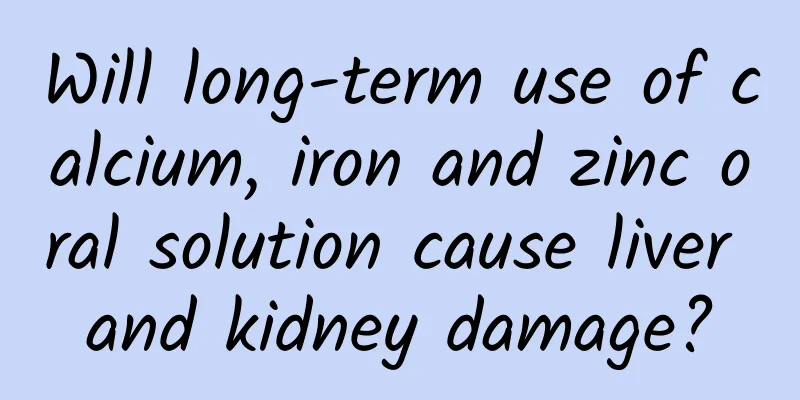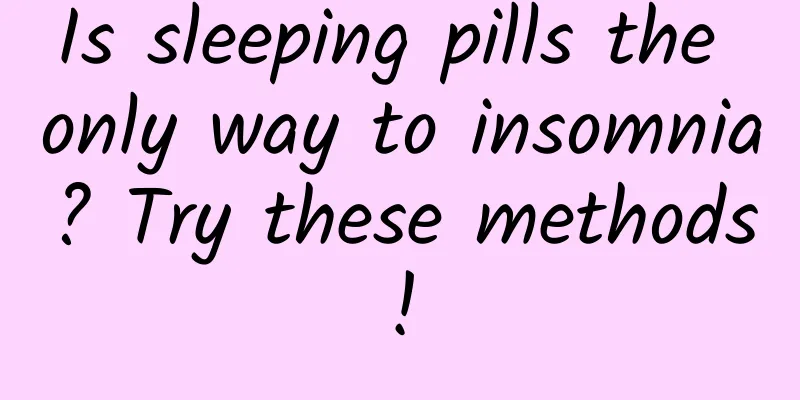Will long-term use of calcium, iron and zinc oral solution cause liver and kidney damage?

|
This is the 4410th article of Da Yi Xiao Hu As the living environment changes, the nutritional content of food decreases. The intake of minerals needed by the human body from vegetables and fruits alone can no longer meet the daily intake requirements. It has become common for children to start taking health products or dietary nutritional supplements. There are a variety of calcium, iron, zinc oral liquids, calcium tablets, zinc gluconate tablets and other trace element supplements on the market. Some parents think that their children cannot "fall behind", so they buy them home to take. Some parents also question whether children can take these trace element supplements for a long time? If the human body is not deficient in trace elements, long-term or excessive use of calcium, iron and zinc oral solution may cause gastrointestinal irritation, increased burden on the gastrointestinal tract, liver and kidneys, abnormal stool, abdominal pain, kidney stones, etc. If you suspect that your child is deficient in trace elements, it is recommended to go to the hospital for relevant tests. After confirmation, you can follow the doctor's advice to supplement. The course of treatment is about 2 to 3 months, and regular review is required to determine whether to continue or stop taking it. The following will focus on calcium, iron and zinc elements, including how to judge their deficiency and how to supplement them scientifically. Calcium is the main component of teeth and bones, which maintains the functions of human cells. It participates in physiological activities such as heart beat, nerve information transmission, muscle contraction, maintains acid-base balance, and participates in blood coagulation. Due to various factors such as changes in modern eating habits or dietary structure, lack of outdoor activities, and picky eating, children and adolescents generally have insufficient calcium intake. Children are in a stage of vigorous growth and development, and bone development is particularly critical during this period. They need a lot of calcium. Calcium deficiency will cause symptoms of knee pain, and even lead to osteoporosis, fractures, incomplete calcification of tooth enamel, and dental caries. In addition, calcium deficiency can cause intellectual and behavioral development disorders, hypocalcemic convulsions, intestinal cramps and abdominal pain in children. According to the "Chinese Residents' Dietary Nutrient Reference Intake" standard proposed by the Chinese Nutrition Society in 2013, the recommended daily calcium intake for children aged 4-10 in my country is 800 mg. The normal reference value for children's serum calcium is 1.55-2.10 mmol/L (or 60.3-100.5 mg/L for boys and 58.9-103.7 mg/L for girls). Calcium supplements should be selected based on the "four highs and one low" standard, namely high calcium content, high solubility (water solubility), high intestinal absorption, high bioavailability and low heavy metal content. In addition, there are several issues to pay attention to when taking calcium supplements: ① Do not take calcium supplements with plant-based foods, such as cereals and vegetables such as spinach, coriander, and amaranth, as they are rich in oxalate, phytic acid, carbonate, and phosphate, which will form insoluble complexes with calcium and are not conducive to absorption; ② Calcium and zinc cannot be taken at the same time, because both are divalent ions and will compete with each other for ion channels. Therefore, zinc should be supplemented first and then calcium, with an interval of 2-3 hours; ③ The more calcium supplementation is not necessarily better. Excessive calcium can cause hypercalcemia, i.e. transient hypertension, arrhythmia, and increase the risk of heart disease and kidney stones in the future. Zinc, as a coenzyme, participates in the synthesis of various enzymes in the body, promotes normal cell differentiation, promotes sexual organ development, enhances immunity, and improves digestive function and appetite. A fasting blood zinc concentration <11.74μmol/L (75μg/dL) can be considered zinc deficiency. Zinc deficiency in children can manifest as: ① Decreased digestive function: loss of appetite, anorexia, pica, diarrhea; ② Growth retardation: short stature; ③ Delayed puberty: small testicles and penis in boys, delayed breast development and menarche in girls; ④ Intellectual development disorder: poor cognitive ability and mental depression; ⑤ Skin, mucous membrane and vision damage: such as oral ulcers, facial acne, thinning and yellowing hair, rough skin, rash, night blindness, etc.; ⑥ Impaired immune function: Repeated respiratory tract, digestive tract or urinary tract infections can affect children's development and growth in all aspects. The World Health Organization sets the maximum tolerable dose of oral zinc for children at 23 mg/d, with a very small safety margin, that is, serum zinc should be controlled within 19.89 μmol/L, and zinc should be stopped immediately when it is >22.95 μmol/L. Excessive zinc can inhibit the absorption of copper and induce an increase in the zinc/copper ratio in the human body, thereby leading to a series of physiological dysfunctions such as myocardial cell oxidative metabolism disorders, hypercholesterolemia, hypochromic microcytic anemia, and leukopenia. Excessive zinc also inhibits the role of iron in the hematopoietic mechanism, causing refractory iron deficiency anemia, and in a high zinc state, it is difficult to cure anemia even if iron preparations are taken. In addition, adverse reactions to oral zinc and symptoms of poisoning can cause digestive tract reactions, such as nausea, vomiting, upper abdominal discomfort, diarrhea, etc., and even gastric ulcers, perforations, and bleeding in severe cases. Mild digestive tract reactions caused by long-term use of zinc sulfate in children are more common. Scientific zinc supplementation methods are generally divided into two categories, namely, zinc supplementation by weight and by age. Take 0.5-1.5 mg/kg·d of elemental zinc orally (equivalent to 2.5-7.5 mg/kg·d of zinc sulfate or 3.5-10.5 mg/kg·d of zinc gluconate) based on body weight. Zinc supplements should be taken according to the daily zinc supply standard based on age. Iron plays a role in hematopoiesis, oxygen transport, information transmission, prevention of arteriosclerosis, improvement of liver and stomach function, and regulation of blood sugar. According to the "Recommendations for the Prevention and Treatment of Iron Deficiency and Iron Deficiency Anemia in Children", the standard for iron deficiency is serum ferritin <15μg/L, with or without decreased transferrin saturation (<15%), and normal hemoglobin. Iron deficiency can lead to low immunity, lack of concentration, decreased memory, stomatitis, etc. Iron deficiency anemia is a type of anemia caused by iron deficiency in the body, which ultimately leads to reduced hemoglobin synthesis (6 months-6 years old <110g/L, 6-14 years old <120g/L), and microcytic hypochromic changes in red blood cells. At the same time, serum ferritin, serum iron and transferrin saturation are reduced, and total iron binding capacity is increased. It is the most serious stage of iron deficiency. Infants and adolescent children have rapid growth and development and a high demand for iron, which can easily lead to iron deficiency. Generally, no additional iron supplementation is required. They can start with breast milk or iron-fortified formula milk, eating fruits and vegetables, and adding iron-rich foods. Children with iron deficiency anemia should first check for the underlying diseases that cause iron deficiency, such as treating chronic bleeding diseases, and use ferrous preparations that are easy for the body to absorb orally. The iron supplement dosage is calculated based on a daily supplement of 2-6 mg/kg of elemental iron (1-2 mg/kg for infants and young children). If iron is supplemented excessively and the liver and kidneys are overloaded, chronic iron poisoning will occur, such as dizziness, nausea and vomiting, diarrhea and abdominal pain. In severe cases, diseases such as cirrhosis, liver edema or liver cancer may occur. Excessive iron supplementation can also cause some heart failure, ovarian damage and irregular menstruation. Tips: Good partners of calcium, iron and zinc Zinc + Vitamin A = Improves Vision Iron + Vitamin C = Promote iron absorption Calcium + vitamin D + sufficient sunlight = promote calcium absorption In summary, although calcium iron zinc oral solution cannot replace the effects of drugs, it is still not suitable for long-term use. If adverse reactions occur, it should be considered whether it is caused by excessive calcium iron zinc. Children with impaired liver and kidney function, hemochromatosis, hypercalcemia, hypercalciuria, etc. are usually prohibited from taking it. "Food supplements are worse than medicine supplements", so it is recommended to improve the dietary structure first, correct bad eating habits such as anorexia and picky eating, and achieve the purpose of taking in enough trace elements from natural foods. Such as calcium-rich milk, eggs, beans and their products, kelp, seaweed, fungus, sesame, hawthorn, dried shrimps, marine fish and vegetables; Iron-rich foods include kelp, seaweed, fungus, green leafy vegetables, chrysanthemum, pork liver, etc. Oysters, fish and shellfish, meat, pine nuts, pumpkin seeds, dried beans, etc. are rich in zinc. Regardless of whether or not they take trace element supplements, it is recommended that children undergo regular trace element testing, and in order to obtain objective values, it is recommended to stop taking the supplements for 3 days before the examination. Author: Xu Wenwen, Department of Pediatrics, Yueyang Hospital of Integrated Traditional Chinese and Western Medicine, Shanghai University of Traditional Chinese Medicine, foreign graduate student. Research direction: spleen and stomach diseases and endocrine diseases. Editor-in-chief and tutor of the column: Shen Jian, Department of Pediatrics, Yueyang Hospital of Integrated Traditional Chinese and Western Medicine, Shanghai University of Traditional Chinese Medicine, chief physician, doctor of medicine, master's supervisor. National TCM inheritance and innovation talent of the Central Administration. Vice Chairman of the TCM Children's Health Care and Health Committee of the World Federation of Chinese Medicine Societies. Co-founder of the "Da Yi Xiao Hu" medical communication think tank, and editor-in-chief of "Cute Baby Development". |
<<: What to do if you feel uncomfortable during exercise? Muscle relaxation can help
>>: Can you still enjoy a seafood feast happily if you have a "small pimple" on your thyroid?
Recommend
What are the harms of abortion to women?
Nowadays people have more open mindsets and are v...
Pain in inner thighs during pregnancy
Every pregnant woman will experience some very un...
Causes of hydrosalpinx
Hydrosalpinx is a symptom that does not seem to b...
Don’t be so obsessed with “cleanliness” after an abortion. You can only wash your hair after a week.
Abortion is very harmful to women's bodies. I...
Canalys: Apple to lead global high-end smartphone market with 62% market share in Q2 2024
According to the latest data from market analysis...
Taking birth control pills during menstruation
In daily life, many women take oral contraceptive...
Chronic vaginitis
Vaginitis is a common gynecological disease among...
Why did the Forbidden City cancel the New Year's Eve dinner? Are there any reservations for the Forbidden City New Year's Eve dinner in 2020?
A few days ago, after the Forbidden City launched...
Menstrual blood is brown and small
We all know that menstruation is a physiological ...
Skin care steps before makeup, these basic work must be done well!
There is a very important process before putting ...
What are the effects of filming on pregnant women?
Pregnant women should avoid all kinds of radiatio...
Is the bone paste in starch sausage really terrible? Can we still eat starch sausage?
During the 315 period this year, starch sausages ...
The best time to lose weight after giving birth
During pregnancy, women generally eat a lot of nu...
Why do women often have lower abdominal pain?
Some women often experience lower abdominal pain,...
Will I get pregnant if I have sex on the day my period is over?
Menstruation is a very normal thing for girls, an...









